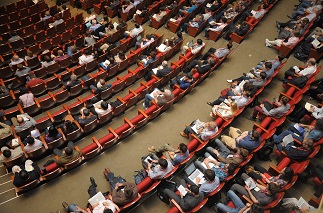Posts

The Irresponsible Self-Regulation of Media in Spain: High-Grade Alcoholic Beverage Advertising in Sports Radio Programmes
Media must behave ethically towards their audiences since the latter play a fundamental role in shaping reality and public opinion. In this sense, the conduct of all media must be based on social responsibility, with ethical values and in compliance with laws and regulations. The present study analyses the presence of advertising for high-alcoholic-content beverages in sports programs through mentions by the host radio stations or collaborators, taking into consideration that the European directive, as well as Spanish legislation, prohibits the broadcasting of this type of advertising through audio-visual media (television and radio) channels, particularly in sports programs. To this purpose, three stations have been selected for analysis (COPE, Cadena Ser and Onda Cero) according to their daily audience numbers as reported by the General Media Study (a total of 9,000,000 daily listeners). The study was carried out between January and December 2017. A total of 355 mentions of high-alcoholic-content beverages were found, being the figure of the host radio the one that made more this type of advertising. Likewise, this research shows that most mentions of alcoholic beverages occurred in the afternoon (16:00–19:59), with rum (55.8%) and herb liqueurs (36.6%) being the most frequently advertised. It is also important to note that COPE, a radio station that has been sanctioned by the Spanish CNMV for this type of advertising, is precisely the radio station that has the highest frequency of alcoholic beverage advertising in this study (91.8%), which is evidence of the failure of the media self-regulation system in Spain.

The notion of educommunication in intergovernamental organizations
This research analyzes the notion that the main international organizations of multilateral character have on the concept of educommunication (media literacy), by means of the correlational extract and analysis of the content of interpretative base of 2.648 information units from 12 organizations, both regional and transcontinental, including the United Nations, the Organization for Economic Cooperation and Development, the Arab League, the International Organization of la Francophonie, the Community of Portuguese-speaking Countries and the Organization of Ibero-American States, African Union, European Union, League of Arab States, Commonwealth of Independent States, Organization of American States, Commonwealth of Latin American and Caribbean States, Union of South American Nations, Association of Southeast Asian Nations, Cooperation Council for the Arab States of the Gulf and Pacific Islands Forum. Regarding the main results, it is evident that 83% of the organizations analyzed, except in the Community of Portuguese Language Countries and in the African Union, the convergence of the educational and communicative context is specifically presented under the terminology “media education”, which influences the formulation of domestic policies through the proposal of incentives and restrictions that affect decision making at the governmental level, alluding to the continuous change and the dynamic construction of identity.

Media Competence in Spanish Secondary School Students. Assessing Instrumental and Critical Thinking Skills in Digital Contexts
The ways in which young people communicate have changed in line with the impact of technologies. This change has been accompanied by growing differences between the young, and their "liquid" experience, and adults with their "solid" experience, and these shapes the state of the question that defines young people as digital natives. This work analyses Spanish adolescents' level of media competence. The sample consisted of 672 students attending secondary schools in 10 provinces in Spain. The average age of the participants was 14. The study aims to show that, although today's adolescents are described as the digital generation, and there is a widely held belief that they are digital natives, their level of media competence is low and there is need for fomenting greater literacy skills in this field. The "ad hoc" questionnaire yielded results that indicate an overall medium level of media competence, but a skills shortage in the dimensions relating to critical thinking, such as in reception and audience, production and programming processes, and ideology and values. The conclusions question the supposed superior competence of digital natives in media. This study underlines the need for a clear definition of the concept of media competence from a convergence perspective.

Media competencies of university professors and students. Comparison of levels in Spain, Portugal, Brazil and Venezuela
Media competencies are a set of skills that every individual should possess in order to be able to consume and produce media and digital and information products in a critical and analytical way. This exploratory and comparative work analyses the level of media competence among 1,676 university students and 524 professors in Brazil, Spain, Portugal and Venezuela. One of the main results shows that the level of knowledge of technology and interaction — which is linked to digital competencies — does not depend solely on age, thus contradicting theories of digital natives and migrants. Our study also found that the general level of media competence is no better than medium to low when considering language, technology, interaction, production and dissemination, ideology and values, and aesthetics. These results point to the need to develop transversal actions for instructing both university professors and students in media competencies to face an ecosystem dominated by fake news and disinformation, as well as public policies directed at improving these skills among citizens at large.

Media Competencies for the Citizenship Training of Teachers from Andean America: Colombia and Ecuador
In an increasingly saturated information and infoxicated world, Media Literacy emerges as a necessity for effective filtering of the vast amount of information we consume. The present research aims to quantitatively analyze the level of media competencies of Colombian(Medellin) and Ecuadorian (Loja and Zamora) teachers by means of the application of an adaptation of the taxonomy from the media competencies model, which consists of 6 dimensions and a total of 12 indicators. The total analyzed sample was comprised of 654 teachers from 81 public and private institutions. A data-gathering instrument was used with the aim of determining their level of media competencies from each of the dimensions. The results showed a low to medium level of media competency knowledge, which illustrated the need for priority interventions based on local, regional and international works, namely those that mobilize scientific, academic and political collaboration to improve the performance of a population that should lead the general training of citizens in media competencies.
